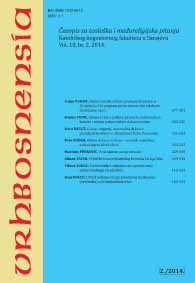ODNOS CRKVE I POLITIKE PREMA II. VATIKANSKOM KONCILU I NEKIM POKONCILSKIM DOKUMENTIMA
RELATIONSHIP BETWEEN CHURCH AND POLITICS ACCORDING TO THE SECOND VATICAN COUNCIL AND A NUMBER OF POSTCONCILIAR DOCUMENTS
Author(s): Franjo TopićSubject(s): Christian Theology and Religion
Published by: Katolički bogoslovni fakultet
Keywords: church; politics; state; John Paul II; Christifideles laici
Summary/Abstract: This article is divided into four parts. The first part presents the doctrine of the constitution as described in Gaudium et spes: in other words it deals with the relationship between church and politics. It deals with the nature and purpose of political community, the cooperation of all in political life, and the political community and the Church. The views of John Paul II on the role of believers in politics are presented through an analysis of the 1987 Synod document on the laity, Christifideles laici, which was published in 1990. The pope strongly urges the laity to become involved in political life and takes the position that abjuring from politics can be sinful, noting that all are subject to and all are protagonists in politics. The pope stresses the necessity of promoting solidarity and charitable works through politics. Church and laity are obliged to evangelize in social and economic life as well as culture. The paper goes on to present the basic ideas of the Catechism of the Catholic Church, and finally the ideas of the Doctrinal Note on Catholics in Politics, issued by the Congregation for the Doctrine of the Faith in 2002. The doctrine of recent Church documents on this topic may be summarized as follows: authority and the state stem from human nature and the moral law, and this means that they have a divine source. They are necessary for the functioning of human life. The common good and respect for persons are the key criteria for judging governments, politicians, regimes and parties. The autonomy and separation of church and state should be recognized. The pluralism of parties and regimes should be recognized. All Christians are called to become involved in political life: in fact, it is sinful not to be involved in politics. If laws or authorities are against the common good and the good of the person, then the believer politician should distance himself from such laws and authorities and should not vote for such laws. The Church should be a critical conscience of society.
Journal: Vrhbosnensia
- Issue Year: 2014
- Issue No: 2
- Page Range: 303-320
- Page Count: 18
- Language: Croatian

